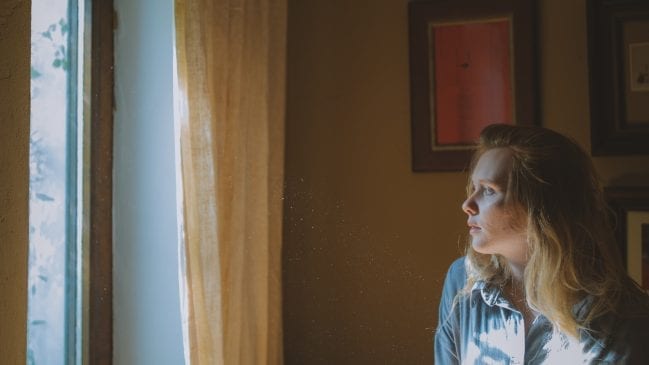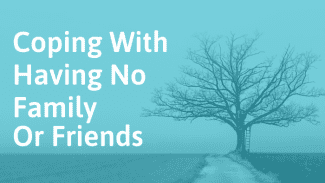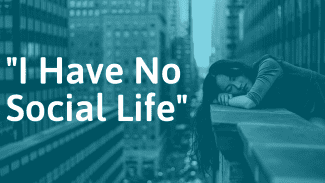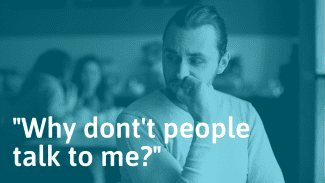We know it’s normal to feel lonely off and on–especially in isolating times during the COVID-19 pandemic—but too often we are hard on ourselves when we face loneliness. We might be tempted to compare ourselves to others who appear to have more social support, and we judge ourselves for a lack of friends or meaningful connections. When we feel lonely and left out, we might be holding on to beliefs or myths about loneliness that stem from social stigma about lonely people.
Our culture churns out stereotypes of lonely people who seem to be unpopular or even “losers” or “social misfits.” We might think of undesirable, reclusive loners in movies or celebrities who are eccentric, isolated weirdos. Social stigma and stereotypes about isolated and lonely people can affect our attitudes towards ourselves about being lonely or isolated. When we feel lonely, many of us are embarrassed or ashamed, fearing that we might appear lonely or “needy” to others. Common myths and stereotypes about loneliness can mislead us and isolate us further.
Indeed, we often turn against ourselves when we feel lonely. Myths in our mind that echo social stigma about loneliness can shatter our confidence, destroying the courage, hope, and wherewithal we need for venturing into relationships.
It could help to take a close look at common myths that make us feel lonely so we can have more compassion for ourselves and one another. It’s revealing to review how our own beliefs might be influenced by our culture.
The following myths can make us feel lonely and commonly stem from social stigma:
| Myths |
Reality |
| You’re alone because you’ve failed at relationships. |
We can all feel this way, though we appear “normal.” |
| You’re alone because there is something wrong with you. |
Many of us are isolated through no fault of our own. |
| There is a reason you ended up alone. |
Both external and internal forces cause isolation. |
| You should hide your loneliness so you don’t bring others down. |
It’s okay to admit you’re lonely—especially in COVID times. Lots of us are in the same situation. |
| Loneliness is embarrassing and shameful. |
We can befriend our loneliness with self-compassion. |
Why am I socially isolated?
| Myths |
Reality |
| You alone are to blame for your isolation. |
Blame isolates us further. |
| Your isolation is caused by your character flaws. |
See the big picture, beyond your own flaws. |
| If you had planned better, made better choices, picked better friends, found a better partner, saved your money, done things differently, you wouldn’t be so isolated. |
Forces greater than ourselves can isolate us. Living in survival mode can isolate us (severe illness, financial loss, bereavement, natural disasters, and other devastating events such as pandemics). |
I need to get out more, but…
| Myths |
Reality |
| Getting out and exploring is no fun if you’re alone. |
Follow your curiosity, even if you’re alone. |
| You look like a loser if you go out to places by yourself. |
Enjoy and explore your community. Take photos, take a tour, start a blog or vlog, walk dogs, people-watch, smell roses. You might be surprised who you meet. |
How do I (dare I) ask for help?
| Myths |
Reality |
| People will think you’re needy if you ask for help. |
Become an advocate for yourself and others. |
| People will judge you if you ask for help. |
Ask for help from people who have been through similar hardships themselves. Reach out to a helpline or support group. You’re in charge even if you’re the one asking for help. Be specific and clear with requests. |
| You shouldn’t burden people. You might scare them away. |
Keep it practical and simple. Avoid asking too much of any one person. Break it down into small steps. |
What if I can’t count on my friends or family?
| Myths |
Reality |
| You should only count on your family or close friends. |
It takes a village to build a solid support system. |
| You should have family and friends to count on, or else something is wrong with you or them. |
No matter how strong (or not) our family and friends are, we all go through isolating times. |
| People who only have therapists are losers. |
Any of us could face a situation so isolating that we turn to a therapist, coach, or mentor. |
| Only a few people can be real friends. |
Genuine support is all around us when we befriend our communities with common interests. |
Showing Up and Reaching Out
| Myths |
Reality |
| When you feel uncertain, awkward, or afraid, you shouldn’t reach out to others because you might say or do the wrong thing. |
Most people appreciate our interest and caring.
We don’t have to feel strong to show that we care. |
| You’re probably intruding if you show up or reach out. |
Our interest and caring can carry us beyond our fears. Most people appreciate our caring. |
Social Media and Isolation
| Myths |
Reality |
| When you’re well-connected on social media, you always have someone to call in a crisis. |
We can have 400 friends on Facebook and on one to call. |
| Social media always means you have a solid support system. |
Even though it helps to connect and organize people through social media, we might need deeper and more meaningful connections in person (with COVID-19 protections) and honest check-ins with each other. |
| The more “likes” you have, the more likeable you really are. And if no “likes,” then no one cares about you. |
I have been truly liked by someone and have liked others. |
Special Observations for Introverts and Highly Sensitive People
| Myths |
Reality |
| Introverts are isolated and they like it that way. |
Introverts need deep, meaningful connections. |
| You should always avoid groups. |
Some groups are designed for introverts by other introverts, highly sensitive people, empaths, and other old souls. We need each other to survive this noisy, extroverted world. |
| You’re always misunderstood so you keep quiet about yourself. |
There are many ways to communicate even if we don’t talk a lot. Plus, people love a good listener. |
Special Observations for Single and/or Childless People
| Myths |
Reality |
| People with spouses, partners, or families are not isolated and lonely. |
Even in a (so-called) “happy marriage,” people can feel alone and unsupported sometimes. They need their single friends to help them through these times. |
| Most couples don’t care enough to understand single people. |
Even our fellow single friends might not understand us at times. Single or not, most people do care and try. |
| People who have kids are judgmental towards people who don’t have kids. |
Some of our friends with children are breaking through the old stigma by getting to know us as a unique person (beyond roles). Let them know how valuable their friendship is to you and keep reaching out. |
Special Observations for People over 50
| Myths |
Reality |
| At your age, you should have lots of friends to rely on. |
As it turns out, we might need to start all over again to build social networks—at 60, 70, or 80. |
| You’ve spent five or six decades building relationships, so you should be able to enjoy a great social life by now. |
It takes a lot of work building (and keeping) relationships at any age. Darn—it might not get easier with age. But we can be more patient and forgiving with each other and ourselves. |
| Older adults don’t have the energy or stamina for new relationships. |
When we are truly interested in others, we feel a boost and our energy rebounds. |
As we reflect on the myths that keep us isolated, we can understand why we have tried to avoid being judged, shamed, or shunned by holding ourselves back from reaching out to others. It may seem simple and obvious that the answer to breaking out of isolation is to connect with others such as volunteering, joining a sports team, or taking a class, but it’s not so simple when these myths and beliefs play havoc with our social confidence. The more we are aware of how these deeply ingrained patterns hold us back from reaching out and building the support we need, the more patient, compassionate, and accepting we can become with ourselves and one another.
Author’s note: This post is an excerpt adapted from the author’s book, 400 Friends and No One to Call, with permission from Central Recovery Press.
Image: Photography PEXELS, Yaroslav Shuraev




